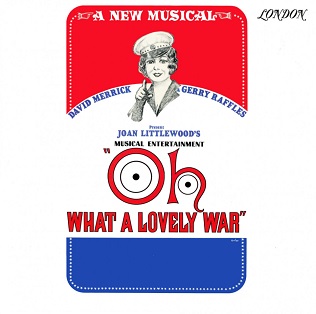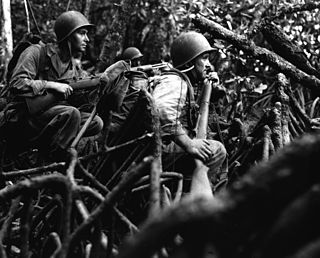Related Research Articles
A soap opera, daytime drama, or soap for short, is typically a long-running radio or television serial, frequently characterized by melodrama, ensemble casts, and sentimentality. The term "soap opera" originated from radio dramas originally being sponsored by soap manufacturers. The term was preceded by "horse opera", a derogatory term for low-budget Westerns.

Radio drama is a dramatized, purely acoustic performance. With no visual component, radio drama depends on dialogue, music and sound effects to help the listener imagine the characters and story: "It is auditory in the physical dimension but equally powerful as a visual force in the psychological dimension." Radio drama includes plays specifically written for radio, docudrama, dramatized works of fiction, as well as plays originally written for the theatre, including musical theatre, and opera.

BBC Radio is an operational business division and service of the British Broadcasting Corporation (BBC) which has operated in the United Kingdom under the terms of a royal charter since 1927. The service provides national radio stations covering the majority of musical genres, as well as local radio stations covering local news, affairs and interests. It also oversees online audio content.

A newsreel is a form of short documentary film, containing news stories and items of topical interest, that was prevalent between the 1910s and the mid 1970s. Typically presented in a cinema, newsreels were a source of current affairs, information, and entertainment for millions of moviegoers. Newsreels were typically exhibited preceding a feature film, but there were also dedicated newsreel theaters in many major cities in the 1930s and ’40s, and some large city cinemas also included a smaller theaterette where newsreels were screened continuously throughout the day.

The British Forces Broadcasting Service (BFBS) provides radio and television programmes for His Majesty's Armed Forces, and their dependents worldwide. Editorial control is independent of the Ministry of Defence and the armed forces themselves. It was established by the British War Office in 1943. In 1944, it was managed by Gale Pedrick.

Dame Gracie Fields was a British actress, singer and comedian. A star of cinema and music hall, she was one of the top ten film stars in Britain during the 1930s and was considered the highest paid film star in the world in 1937. Fields was known affectionately as Our Gracie and the Lancashire Lass and for never losing her strong, native Lancashire accent. She was appointed a Commander of the Order of the British Empire (CBE) and an Officer of the Venerable Order of St John (OStJ) in 1938, and a Dame Commander of the Order of the British Empire (DBE) in 1979.

BBC television dramas have been produced and broadcast since even before the public service company had an officially established television broadcasting network in the United Kingdom. As with any major broadcast network, drama forms an important part of its schedule, with many of the BBC's top-rated programmes being from this genre.

Oh, What a Lovely War! is an epic musical developed by Joan Littlewood and her ensemble at the Theatre Workshop in 1963. It is a satire on World War I, and by extension on war in general. The title is derived from the "somewhat satirical" music hall song "Oh! It's a Lovely War!", which is one of the major numbers in the production.

Shortwave listening, or SWLing, is the hobby of listening to shortwave radio broadcasts located on frequencies between 1700 kHz and 30 MHz (30 000 kHz). Listeners range from casual users seeking international news and entertainment programming, to hobbyists immersed in the technical aspects of long-distance radio reception and sending and collecting official confirmations that document their reception of remote broadcasts (DXing). In some developing countries, shortwave listening enables remote communities to obtain regional programming traditionally provided by local medium wave AM broadcasters. In 2002, the number of households that were capable of shortwave listening was estimated to be in the hundreds of millions.

G.I. is an informal term that refers to "a soldier in the United States armed forces, especially the army". It is mostly deeply associated with World War II, but continues to see use.

Betty Astell, born Betty Julia Hymans, was an English actress, best known for comedy and pantomime productions on stage, screen, and radio with her husband, Cyril Fletcher. She was one of the first performers to appear on television, in experimental broadcasts by the BBC in 1932.

Television Newsreel is a British television programme, the first regular news programme to be made in the UK. Produced by the BBC and screened on the BBC Television Service from 1948 to 1954 at 7.30 pm, it adapted the traditional cinema newsreel form for the television audience, covering news and current affairs stories as well as quirkier 'human interest' items, sports and cultural events.
Derek Ivor Breashur McCulloch OBE was a BBC Radio producer and presenter. He became known as "Uncle Mac" on Children's Hour and Children's Favourites. He was the head of children's broadcasting for the BBC from 1933 until 1951.

The BBC General Forces Programme was a national radio station operating from 27 February 1944 until 31 December 1946.
Radio Luxembourg was a multilingual commercial broadcaster in Luxembourg. It is known in most non-English languages as RTL.
Radio Newsreel is a news programme produced by the British Broadcasting Corporation between 1940 and 1988. The 15-minute programme, which was eventually broadcast four times a day on the BBC World Service with a daily broadcast on the BBC Light Programme, was composed of recorded dispatches from correspondents in the field, live and recorded actuality and such other features, borrowed from the format of the cinema newsreel, as interviews with people currently in the news.
The British Broadcasting Corporation (BBC) is a British public service broadcaster headquartered at Broadcasting House in London, England. Originally established in 1922 as the British Broadcasting Company, it evolved into its current state with its current name on New Year's Day 1927. The oldest and largest local and global broadcaster by stature and by number of employees, the BBC employs over 21,000 staff in total, of whom approximately 17,900 are in public-sector broadcasting.
The Pepsodent Show is an American radio comedy program broadcast from 1938 to 1948, during the Golden Age of Radio. The program starred Bob Hope and Jerry Colonna, alongside Blanche Stewart, Elvia Allman, and a continuously rotating supporting cast of actors and musicians which included, for a time, Judy Garland, Frances Langford, and Desi Arnaz and his orchestra.

"CivvyStreet" is a spin-off episode of the British television soap opera EastEnders, broadcast on BBC1 on 26 December 1988. The episode is a flashback to World War II and is set at Christmas 1942. The episode was watched by 7 million viewers.
This is a list of events from British radio in 1953.
References
- ↑ Kuffert, Len (1 November 2016). Canada before Television: Radio, Taste, and the Struggle for Cultural Democracy. McGill-Queen's Press - MQUP. ISBN 978-0-7735-9981-9.
- ↑ Cull, Nicholas John (1995). Selling War: The British Propaganda Campaign against American "Neutrality" in World War II . Oxford University Press. pp. 135–136. ISBN 0-19-508566-3.
